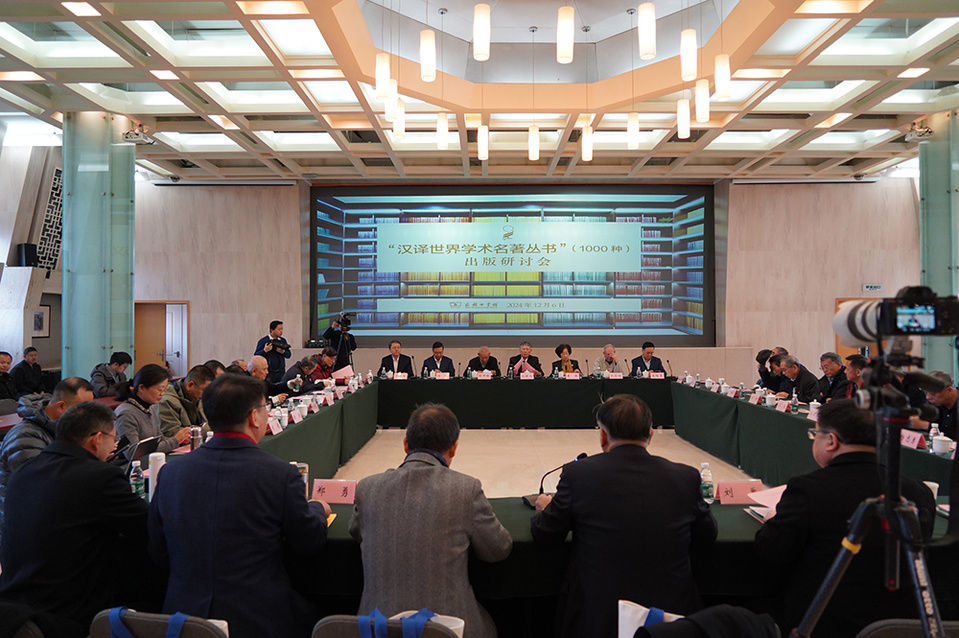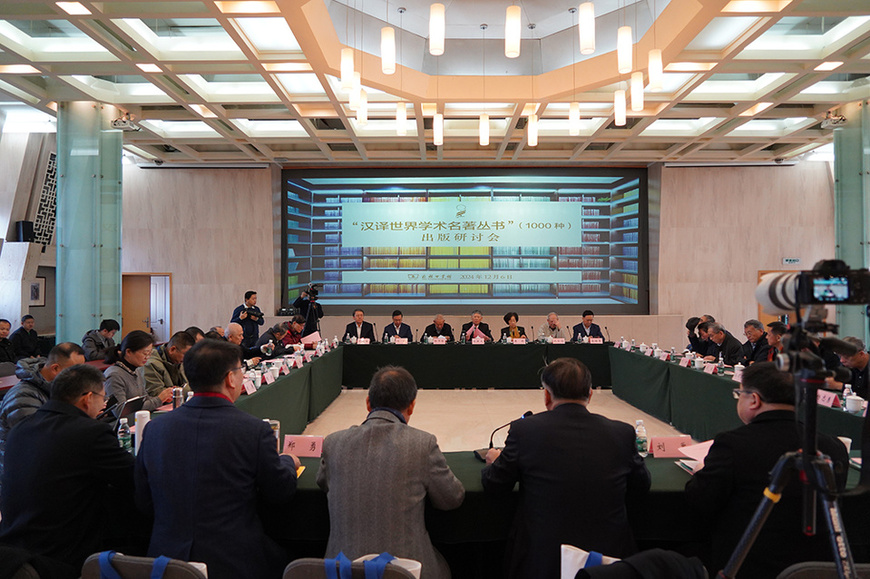By Zhang Mingse, People's Daily
The Commercial Press, a leading publishing house in China, just celebrated a remarkable milestone this year: the publication of the 1,000th title in its "Chinese Translations of World Academic Masterpieces Series."
Over 42 years, this collection has grown to include 1,000 works, with cumulative sales reaching tens of millions books.
As one of the most ambitious academic translation projects in modern Chinese publishing history, the Series carefully selects and expertly translates seminal works from the vast expanse of global academic literature, contributing intellectual resources to national development and social progress.
The Series has become a highly respected and widely recognized hallmark of quality. Timeless classics such as Plato's The Republic, Jean-Jacques Rousseau's The Social Contract, Alexis de Tocqueville's The Old Regime and the Revolution, and John Maynard Keynes' The General Theory of Employment, Interest, and Money remain perennial bestsellers, consistently appealing to generations of readers.
This is a collection that has always been closely aligned with the times. In 1905, The Commercial Press published Yan Fu's Chinese translation of Evolution and Ethics by Thomas Henry Huxley, introducing the theory of natural selection, which profoundly influenced modern China.
In subsequent years, many series brought together works reflecting diverse academic perspectives, acting as a beacon of knowledge and inspiration during pivotal moments of national rejuvenation and progress, akin to distant dandelions spreading seeds of enlightenment.
In the early days of China's reform and opening up, the demand for academic reading material surged amid what was then a "book famine." In the preface to the first book of the Series, Chen Yuan, then editor-in-chief of the Commercial Press, noted, "The publication of this collection is a response to the needs of the times."
Thanks to the Series, translated works such as Lectures on Aesthetics by Georg Wilhelm Friedrich Hegel, History of the French Revolution from 1789 to 1814 by Francois Mignet, and Adam Smith's An Inquiry into the Nature and Causes of the Wealth of Nations introduced a generation of young scholars to expansive academic vistas and intellectual exploration.
"Our generation of academics built the foundations of contemporary Chinese scholarship with the help of this collection," remarked Han Zhen, director of the Academic Committee at Beijing Normal University.
Today, the era of the "book famine" is long past. Expectations for the Series have shifted from questions of availability to concerns about quality and diversity. The times call for more expansive disciplinary coverage, improved translation quality, and broader academic horizons.
"In recent years, the Series has evolved in two key ways: extending its temporal scope and expanding its geographic and linguistic range," said Li Xia, deputy editor-in-chief of the Commercial Press.
The chronological scope, once informally limited to works published before 1848, has gradually extended to include titles from the mid-20th century, the 1980s, and even the late 20th century.
Additionally, the editors have increasingly turned their attention beyond Western civilization, incorporating significant works from Central Asia, Southeast Asia, Latin America, and other regions. A growing number of these translations are rendered directly from the original languages, delivering authentic academic nourishment to Chinese readers.
Why has the Series gained such enduring popularity? Beyond its meticulous selection of topics, exceptional translation quality, and rigorous editorial structure, its success lies in its comprehensive inclusion of classics from diverse civilizations.
Chen Xiaowen, editor-in-chief of the Commercial Press, said that the translated masterpieces are characterized by their classic status and systematic approach. The selected titles represent the intellectual and cultural essence of various eras, nations, and peoples.
"Translating a classic is not merely about aligning two languages - it is about fostering a dialogue between two systems of thought." This statement from one of the Series' translators left a deep impression on Li Tingting, director of the academic editing center of the Commercial Press.
From the choice of a single word to the compilation of an entire anthology, the translations are imbued with the spirit of the times, reflecting how contemporary Chinese scholars view the essence of human thought.
"The goal of these translations is to anchor human spiritual achievements, serving readers of today and tomorrow," Li said.
"The Series has opened a window into the world's academic achievements, enabling us to learn from the entirety of human civilization with an open mind. It has played a pivotal role in the modernization and globalization of Chinese scholarship," noted Gao Peiyong, former deputy director of the Chinese Academy of Social Sciences.
From the perspective of building an autonomous knowledge system in Chinese philosophy and social sciences, and advancing Chinese-style modernization, 1,000 titles are far from sufficient, said Gu Qing, executive director of the Commercial Press.
"We are undaunted by the scale, unfazed by the timeline, and undeterred by the challenges. From this moment forward, we set sail once again, aiming to expand the Series to 2,000 titles," Gu added.
Over 42 years, this collection has grown to include 1,000 works, with cumulative sales reaching tens of millions books.
As one of the most ambitious academic translation projects in modern Chinese publishing history, the Series carefully selects and expertly translates seminal works from the vast expanse of global academic literature, contributing intellectual resources to national development and social progress.
The Series has become a highly respected and widely recognized hallmark of quality. Timeless classics such as Plato's The Republic, Jean-Jacques Rousseau's The Social Contract, Alexis de Tocqueville's The Old Regime and the Revolution, and John Maynard Keynes' The General Theory of Employment, Interest, and Money remain perennial bestsellers, consistently appealing to generations of readers.
This is a collection that has always been closely aligned with the times. In 1905, The Commercial Press published Yan Fu's Chinese translation of Evolution and Ethics by Thomas Henry Huxley, introducing the theory of natural selection, which profoundly influenced modern China.
In subsequent years, many series brought together works reflecting diverse academic perspectives, acting as a beacon of knowledge and inspiration during pivotal moments of national rejuvenation and progress, akin to distant dandelions spreading seeds of enlightenment.
In the early days of China's reform and opening up, the demand for academic reading material surged amid what was then a "book famine." In the preface to the first book of the Series, Chen Yuan, then editor-in-chief of the Commercial Press, noted, "The publication of this collection is a response to the needs of the times."
Thanks to the Series, translated works such as Lectures on Aesthetics by Georg Wilhelm Friedrich Hegel, History of the French Revolution from 1789 to 1814 by Francois Mignet, and Adam Smith's An Inquiry into the Nature and Causes of the Wealth of Nations introduced a generation of young scholars to expansive academic vistas and intellectual exploration.
"Our generation of academics built the foundations of contemporary Chinese scholarship with the help of this collection," remarked Han Zhen, director of the Academic Committee at Beijing Normal University.
Today, the era of the "book famine" is long past. Expectations for the Series have shifted from questions of availability to concerns about quality and diversity. The times call for more expansive disciplinary coverage, improved translation quality, and broader academic horizons.
"In recent years, the Series has evolved in two key ways: extending its temporal scope and expanding its geographic and linguistic range," said Li Xia, deputy editor-in-chief of the Commercial Press.
The chronological scope, once informally limited to works published before 1848, has gradually extended to include titles from the mid-20th century, the 1980s, and even the late 20th century.
Additionally, the editors have increasingly turned their attention beyond Western civilization, incorporating significant works from Central Asia, Southeast Asia, Latin America, and other regions. A growing number of these translations are rendered directly from the original languages, delivering authentic academic nourishment to Chinese readers.
Why has the Series gained such enduring popularity? Beyond its meticulous selection of topics, exceptional translation quality, and rigorous editorial structure, its success lies in its comprehensive inclusion of classics from diverse civilizations.
Chen Xiaowen, editor-in-chief of the Commercial Press, said that the translated masterpieces are characterized by their classic status and systematic approach. The selected titles represent the intellectual and cultural essence of various eras, nations, and peoples.
"Translating a classic is not merely about aligning two languages - it is about fostering a dialogue between two systems of thought." This statement from one of the Series' translators left a deep impression on Li Tingting, director of the academic editing center of the Commercial Press.
From the choice of a single word to the compilation of an entire anthology, the translations are imbued with the spirit of the times, reflecting how contemporary Chinese scholars view the essence of human thought.
"The goal of these translations is to anchor human spiritual achievements, serving readers of today and tomorrow," Li said.
"The Series has opened a window into the world's academic achievements, enabling us to learn from the entirety of human civilization with an open mind. It has played a pivotal role in the modernization and globalization of Chinese scholarship," noted Gao Peiyong, former deputy director of the Chinese Academy of Social Sciences.
From the perspective of building an autonomous knowledge system in Chinese philosophy and social sciences, and advancing Chinese-style modernization, 1,000 titles are far from sufficient, said Gu Qing, executive director of the Commercial Press.
"We are undaunted by the scale, unfazed by the timeline, and undeterred by the challenges. From this moment forward, we set sail once again, aiming to expand the Series to 2,000 titles," Gu added.
 Menu
Menu
 The Commercial Press' "Chinese Translations of World Academic Masterpieces Series" reaches 1,000 titles
The Commercial Press' "Chinese Translations of World Academic Masterpieces Series" reaches 1,000 titles

















